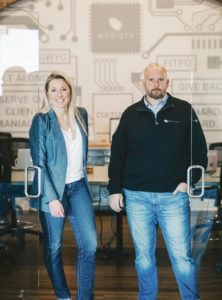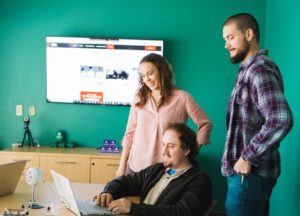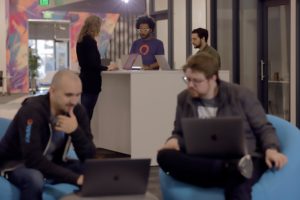Three Arkansas tech startups are changing the meaning of that old adage
By Dwain Hebda
Time was, if you were going to be taken seriously in the tech world, you headed to where the action was—geeky coastal hubs of talent, where tech-savvy investors were rumored to lurk around every corner and behind every bush.
But look around in 2020 and you’ll discover that the most desirable addresses in tech these days are less likely to be found on the coasts. Instead, as reported in Inc. Magazine this past February, tech entrepreneurs and industry giants alike are forgoing the traditional enclaves and heading to the desert (Phoenix, Reno), the South (Nashville), and the Gulf (New Orleans).
And why? Economics, primarily. The costs of living and of doing business are substantially lower in these emerging cities (although Austin and Nashville show how fast those cost indexes can catch up). Another reason is, frankly, because they can. With the COVID-19 pandemic forcing many in tech to work from home, the importance of being located in any given place has been greatly diluted. And considering that tech is already hard up for qualified talent, employees are finding they have more leverage than ever to live where they love; they can just log in to do the rest.
Arkansas has yet to reach the tech density of some other places, but it’s absolutely incorrect to think there aren’t innovative, cutting-edge companies starting up right here in The Natural State. The following are three such maverick firms that bucked the old location trend and won.
MOVISTA

Photo By Novo Studio
MOVISTA IS A company that would be right at home in any tech hotbed you could name—Silicon Valley, Chicago, New York, to name a few. But the developer of retail management tools, which two years ago landed $12 million in venture capital financing to accelerate its operations and development, resides instead in Bentonville, Arkansas.
Company co-founder April Seggebruch says the company is a testament to The Natural State’s business-forward environment, especially as it pertains to startups. “The code you write in Arkansas is identical to the code you write in California. The altitude or the air quality does not impact your coding,” she says. “If nothing else, COVID has demonstrated that hiring knows no geographical boundaries. You can work from anywhere.”
It’s a fact, she says, that there aren’t as many tech companies in Arkansas as there are on the West Coast. “But that’s also a challenge to that next technologist with the next great idea to start their own tech company,” says Seggebruch. “I can assure you, from an investment and from a business front, there’s a lot of support and a lot of momentum here behind creating more of those companies. That level of community support is something the West Coast does not have.”
Movista launched its first product 10 years ago and has since grown into a major player in bringing retail management operations into the digital age. Its signature project, Movista One, helps retail managers assign and track work assignments across multiple locations quickly and efficiently.
Co-founder Stan Zylowski says the quality of the company’s people plays a huge role in Movista’s success, and, together, they’ve crafted a broad culture that approaches its mission differently from other tech companies. “There’s this whole idea that working in the tech industry, you need to be a developer of code,” says Zylowski. “That’s an absolute falsehood. As a matter of fact, we’re in a time where there is such an acceleration in the intelligence of the way code is developed that the image of people sitting and just pounding out lines of code is going to go away. As the technology gets smarter and smarter, the languages are so much more simplified that the value in a technology company is way more about the creativity of the product, the design element, the simplicity, the way that it’s marketed, et cetera.”
In this new environment, says Zylowski, the most valuable employees will be those who can understand how to identify customers’ problems and envision products that meet those needs and make work life easier. “To work in an environment where the actual product or value delivered is via software or via technology, yes, every company has to have technologists. But I’m the CEO of a tech company and I can’t read code. And there’s an entire cadre of people who work for us who do nothing but design the product and none of them can write code.

Photo By Novo Studio
“What they are expert at doing is listening and discerning what the problem is. That’s what we call the ‘what.’ They figure out the ‘what’ side of the equation and then someone else figures out the ‘how’ side.”
The company harnesses this mentality to quickly and effectively pivot to meet customer needs. Case in point: During the pandemic, the Movista One platform was adapted to help companies track and monitor COVID-19 protocols among employees. This not only helps keep people safe, but provides statistical data that lets the company know if there’s a spike at a given location.
“Technology is, by its nature, fluid and iterative,” Zylowski says. “So, for anyone who’s been around video games, you’d never have had Atari if you hadn’t had Pong. You’d never have had Nintendo if you hadn’t had Atari. It’s a building block-type thing.”
“We need our technologists to be flexible and skate to where the puck’s going,” says Seggebruch. “That’s a fundamentally important thing to remember, to remain flexible. Always be out there looking at what’s the next thing.”
As the company has prospered—employee headcount is more than 100 at present—the co-founders have taken active roles in promoting Arkansas’s tech community in an effort to attract and retain the best and brightest home-grown talent. And while they agree that strides have been made, there’s plenty of untapped potential yet to be mined.
“The great equalizer is the computer. People of color, gender minorities, not only are they not marginalized in the technical sphere, they are coveted as resources in the technical sphere,” Zylowski says. “We cannot find and recruit enough minority talent. We just can’t find them and that’s a challenge. It clearly hampers the breadth of thought around the ‘what,’ right? I mean, you don’t have that key insight.
“That’s a point I would want to make and would encourage people of all different backgrounds, race, sex, whatever, to consider a technological or technology job.”
IDESTINI

LIKE MANY PEOPLE, Abby Sims found her professional road to be anything but a straight path. But what the founder of Idestini in Bryant has always had was an eye for opportunity.
“I definitely think you need to cast a wide net and take the opportunities that come,” she says. “If you want to be a great video game programmer, that’s awesome, but you might have to do something else first. You might need that to be your side passion that you work on nights and weekends. Work is not always sexy and we all have to cut our teeth and learn. There are some really good things that we can learn from places that you wouldn’t even think that you’re attracted to.”
Sims launched Idestini in 2014, delivering custom software solutions to clients as varied as national sports governing bodies to international corporations. She says the sum total of her previous work experiences laid the foundation for her company’s success. “When you’re starting out, you need to be wide open to opportunity because, first off, you can’t wait for that dream job. If you wait for that dream job, you’re going to be behind,” she says. “You’re better off doing something. It’s like training for a big game; you’re better off practicing than sitting on the bench.”
For most of her career, Sims had no designs on launching her own business. But after working remotely for one of her employers, she started to get a taste for keeping her own hours and acting like her own boss. “I started thinking, ‘What if I got my own clients? What if I did this myself?’” she says. Idestini launched shortly thereafter.
Sims grew up on the east coast. A bright student who finished high school bound to be a journalist, she got a rude awakening in college. “I figured out I hated journalism school,” she says. “I dropped out of college and went back home trying to figure out what to do with myself. I ended up taking coursework at what then would be like an ITT Tech school in New Jersey.”
Even with 300 hours in computer programming and web design, and gathering some work experience along the way, Sims’ saw her tech career get derailed before it even started thanks to the one-two punch of the dot.com bubble bursting and 9/11. “Here I am, in between Philadelphia and New York City, and I’m one of like, 6,000 people applying for a job,” she says. “It was not a good time to be where I was, looking to start my career in tech.”
Moving to Arkansas’s greener job pastures landed her in Arkadelphia, then Little Rock. A string of tech roles followed, from the Arkansas Crime Lab to Southwest Power Pool to state government. Each stop allowed her to sharpen her skills and exposed her to what was new in tech. “I had an opportunity to work for Rockfish Interactive in Little Rock,” she says. “That was a lot of fun because we worked on a lot of social media, digital web app stuff. We had two campaigns for White Cloud Toilet Paper; we used to make apps to put on Facebook for people to submit their photos, and then the community would vote on the best things that had been made out of used toilet paper rolls.

“With Sam’s Club, we did a virtual cheese tour, where new cheeses would unlock every week. They were from all around the world and, obviously, Sam’s Club was trying to promote that they were carrying these products in their stores. We got to work on some highly interactive, fun, visual stuff.”
Sims says a key takeaway from her journey from employee to entrepreneur is something she reiterates to the many interns who have come to work for her over the years. That is, working your way to your dream job often comes with paying one’s dues in other positions. She hands out similar facts of tech life to women and minorities considering the tech field. “I’ve always felt welcomed in the places that I’ve worked here in Arkansas,” she says, “but women are still going to have to be willing to be the only woman in the room for a while. That’s just part of our journey. There are going to be places where it’s going to be more diverse and there’s going to be places where you might be the only woman and we need to be ok with that, right? It’s worth it. It really is worth it. It’s such a good career field and there are so many amazing opportunities.
“Plus, there really is an interest here in building a diverse workforce, whether you’re a woman or a minority. Companies today are eager to have diversity, they’re eager to bring more women into tech, and the only way to do that is to interview more women. So, I would just really encourage girls, even if they go to college and major in something else, to take a programming class and give it a shot. They may enjoy it more than they think.”
APPTEGY

IN THE BUSINESS world, companies go to great lengths and considerable expense to develop their brand based on products or services. Schools have traditionally lagged in telling their stories effectively, even to their own students and parents.
Little Rock-based Apptegy was created out of the need for better communication between schools and their existing families. “We offer a tech product that helps school leaders bring all of their information to one place, and it makes it really easy for them to communicate,” says Tyler Vawser, Apptegy’s vice president of people. “The goal is not just to send out a text message, but to create an experience and to highlight that school district’s strengths.
“School choice has become such a big topic. Superintendents, especially public school superintendents, are wrestling with this idea of private schools, charter schools, even virtual schools, and, depending on their location, they’re all fighting for the same students. The question we ask them is, ‘How, as a school district, are you going to stand out—and how are you making sure that you’re communicating your strengths?’”
The company got its start when founder Jeston George noticed his nephew’s kindergarten teacher spent a lot of time on phone calls and texts reminding parents of upcoming school events and deadlines. George wondered why this couldn’t be automated via an app or website.
Turns out the problem wasn’t that such tools didn’t exist; it’s that they weren’t integrated, as company officials found out when they started interviewing superintendents. “One of the things we kept hearing was they don’t really need another app,” says Vawser. “They already have enough systems. They can’t keep up with the systems they do have. ‘Our website is over here, our alert system is over there. We don’t have an app yet, but we also have to keep up with Facebook and Twitter.’

“So even in the early days, we moved from just thinking about how to build apps for schools to, How do we help schools think about their whole communication strategy and really empower them to run their schools better in a way that doesn’t require more effort, more time, or more people?”
Apptegy developed powerful tools that not only allow school districts to tell their story, but are easy to update via Thrillshare, a product that delivers updates, alerts, texts, and announcements to whatever device the audience chooses to receive it. Teachers can update school news from field trips or coaches right from the sidelines, quickly and easily.
Building a better product was only part of the equation; building a new business required additional support and personnel. “When you’re trying to create something from nothing and scale it extremely rapidly, everything is an outsized challenge and you can’t fail at any of it, including development, sales, hiring, customer service, and funding,” says Jeston George. “I’ve been fortunate to benefit from a number of entrepreneurial support organizations and state agencies that were instrumental in helping us get going, such as Fund for Arkansas’ Future, the Arkansas Development Finance Authority, the Venture Center, and Innovate Arkansas.”
 Among these needs are personnel. Vawser says that part of the challenge is that many prospective employees don’t know about tech companies like Apptegy that are based in Arkansas, even if they’re a game-changer with national reach. “We’re not just a local company,” says Vawser. “Our clients are across 49 states and we work with over 1,500 school districts at this point, mostly public school districts, but we have some charter and private schools as well. There’s a lot of businesses that don’t have the national reach we do.
Among these needs are personnel. Vawser says that part of the challenge is that many prospective employees don’t know about tech companies like Apptegy that are based in Arkansas, even if they’re a game-changer with national reach. “We’re not just a local company,” says Vawser. “Our clients are across 49 states and we work with over 1,500 school districts at this point, mostly public school districts, but we have some charter and private schools as well. There’s a lot of businesses that don’t have the national reach we do.
“However, one of the biggest issues is always going to be talent. You think about the biggest cities and what they have going for them, it’s that they have a lot more people to talk to and that means more experience, more variations of background. Little Rock doesn’t have as much of it, but what you do have are people more committed to being here long-term.”
 Vawser says that while technical skills are getting easier to come by, thanks to computer courses in Arkansas schools, they aren’t the only thing he, as a hiring manager, looks for in an applicant. “One of the most important things you see in a lot of engineers is that they’re self-driven,” he says. “Some of our engineers have computer science degrees and some don’t. But all of them are very curious and self-driven. It doesn’t matter where you are—the Internet is there. So, you have access to most of the same resources here in Little Rock or anywhere in Arkansas that someone has in New York City or San Francisco or Shanghai. The question is, ‘What are you going to make of that?’ If you can self-teach and you can make use of those resources, that’s a very interesting profile for us.”
Vawser says that while technical skills are getting easier to come by, thanks to computer courses in Arkansas schools, they aren’t the only thing he, as a hiring manager, looks for in an applicant. “One of the most important things you see in a lot of engineers is that they’re self-driven,” he says. “Some of our engineers have computer science degrees and some don’t. But all of them are very curious and self-driven. It doesn’t matter where you are—the Internet is there. So, you have access to most of the same resources here in Little Rock or anywhere in Arkansas that someone has in New York City or San Francisco or Shanghai. The question is, ‘What are you going to make of that?’ If you can self-teach and you can make use of those resources, that’s a very interesting profile for us.”


